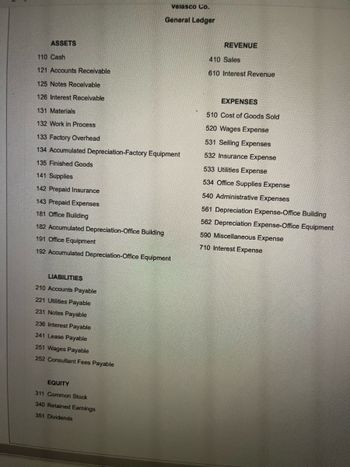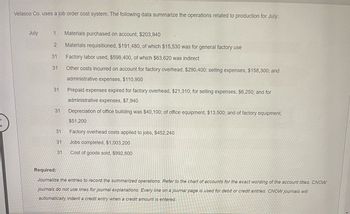
FINANCIAL ACCOUNTING
10th Edition
ISBN: 9781259964947
Author: Libby
Publisher: MCG
expand_more
expand_more
format_list_bulleted
Concept explainers
Topic Video
Question

Transcribed Image Text:ASSETS
110 Cash
121 Accounts Receivable
125 Notes Receivable
126 Interest Receivable
131 Materials
132 Work in Process
133 Factory Overhead
134 Accumulated Depreciation-Factory Equipment
135 Finished Goods
141 Supplies
142 Prepaid Insurance
143 Prepaid Expenses
181 Office Building
182 Accumulated Depreciation-Office Building
191 Office Equipment
192 Accumulated Depreciation-Office Equipment
LIABILITIES
210 Accounts Payable
221 Utilities Payable
231 Notes Payable
236 Interest Payable
241 Lease Payable
Velasco Co.
General Ledger
251 Wages Payable
252 Consultant Fees Payable
EQUITY
311 Common Stock
340 Retained Earnings
351 Dividends
REVENUE
410 Sales
610 Interest Revenue
EXPENSES
510 Cost of Goods Sold
520 Wages Expense
531 Selling Expenses
532 Insurance Expense
533 Utilities Expense
534 Office Supplies Expense
540 Administrative Expenses
561 Depreciation Expense-Office Building
562 Depreciation Expense-Office Equipment
590 Miscellaneous Expense
710 Interest Expense

Transcribed Image Text:Velasco Co. uses a job order cost system. The following data summarize the operations related to production for July:
July
1 Materials purchased on account, $203,940
Materials requisitioned, $191,480, of which $15,530 was for general factory use
Factory labor used, $598,400, of which $63,620 was indirect
Other costs incurred on account for factory overhead, $290,400; selling expenses, $158,300; and
administrative expenses, $110,900
Prepaid expenses expired for factory overhead, $21,310; for selling expenses, $6,250; and for
administrative expenses, $7,940
Depreciation of office building was $40,100; of office equipment, $13,500; and of factory equipment,
$51,200
Factory overhead costs applied to jobs, $452,240
Jobs completed, $1,003,200
Cost of goods sold, $992,600
2
31
31
31
31
31
31
31
Required:
Journalize the entries to record the summarized operations. Refer to the chart of accounts for the exact wording of the account titles. CNOW
journals do not use lines for journal explanations. Every line on a journal page is used for debit or credit entries. CNOW journals will
automatically indent a credit entry when a credit amount is entered.
Expert Solution
This question has been solved!
Explore an expertly crafted, step-by-step solution for a thorough understanding of key concepts.
Step by stepSolved in 2 steps

Knowledge Booster
Learn more about
Need a deep-dive on the concept behind this application? Look no further. Learn more about this topic, accounting and related others by exploring similar questions and additional content below.Similar questions
- Kaymer Industries Inc. uses a job order cost system. The following data summarize the operations related to production for January, the first month of operations: a. Materials purchased on account, $28,790. b. Materials requisitioned and factory labor used: Job Materials Factory Labor 301 $2,880 $2,910 302 3,690 3,860 303 2,300 1,780 304 7,820 6,990 305 5,310 5,050 306 3,700 3,280 For general factory use 1,070 4,180 c. Factory overhead costs incurred on account, $5,600. d. Depreciation of factory machinery and equipment, $1,970. e. The factory overhead rate is $53 per machine hour. Machine hours used: Job Machine Hours 301 25 302 34 303 30 304 71 305 42 306 26 Total 228 f. Jobs completed: 301, 302, 303, and 305. g. Jobs were shipped and customers were billed as follows: Job 301, $8,270; Job 302, $11,720; Job 303, $15,730. Required: 1. Journalize the entries to…arrow_forwardDemere Corporation uses a job costing system. On January 1, Demere Corporation's work in process inventory account had a balance of $75,000. During the year, materials requisitioned for use in production amounted to $120,000, of which $82,000 represented direct materials. Factory wages for the period were $231,000, of which $219,000 were for direct labor. Manufacturing overhead is allocated on the basis of 85% of direct labor cost. Actual overhead cost for the year was $125,000. Jobs costing $345,000 were completed during the year. The December 31 work in process (WIP) inventory balance is closest to Select one: a. $186,500 b. $156,000 c. $168,000 d. $217,150 e. $426,000arrow_forwardKaymer Industries Inc. uses a job order cost system. The following data summarize the operations related to production for January, the first month of operations: a. Materials purchased on account, $33,100. b. Materials requisitioned and factory labor used: Job Materials Factory Labor 301 $2,740 $5,460 302 3,980 2,930 303 2,570 3,070 304 8,850 8,520 305 6,210 1,840 306 4,290 6,110 For general factory use 1,200 4,520 c. Factory overhead costs incurred on account, $6,470. d. Depreciation of factory machinery and equipment, $1,790. e. The factory overhead rate is $65 per machine hour. Machine hours used: Job Machine Hours 301 52 302 28 303 44 304 65 305 36 306 79 Total 304 f. Jobs completed: 301, 302, 303, and 305. g. Jobs were shipped and customers were billed as follows: Job 301, $23,450; Job 302, $19,210; Job 303, $17,360. Required: 1. Journalize the entries to…arrow_forward
- Ottoson Fencing Inc. uses job order costing. The following data summarize the operations related to production for December, the first month of operations: a. Materials purchased on account, $50,000. b. Materials requisitioned and factory labor used: Job 301 302 303 304 305 306 For general factory use Job Machine Hours 301 302 303 c. Factory overhead costs incurred on account, $1,800. d. Depreciation of machinery and equipment, $2,700. e. The factory overhead rate is $40 per machine hour. Machine hours used: 304 305 306 Total 30 60 41 63 70 36 Materials Factory Labor $1,850 $2,500 3,150 2,200 1,900 4,230 1,770 1,200 300 7,220 5,350 2,300 6,225 2,900 5,000 1. Jobs completed: 301, 302, 303, and 305. g. Jobs were shipped and customers were billed as follows: Job 301, $9,000; Job 302, $16,150; Job 303, $12,800. Required: 1. Journalize the entries to record the summarized operations. Record each item (items a-f) as an individual entry on December 31. Record item g as 2 entries. 2. Post the…arrow_forwardBarnes Company uses a job order cost system. The following data summarize the operations related to production for October: October 1 Materials purchased on account, $663,320. Materials requisitioned, $618,780, of which $71,310 was for general factory use. Factory labor used, $640,350, of which $88,200 was indirect. Other costs incurred on account for factory overhead, $140,430; selling expenses, $245,050; and administrative expenses, $145,440. 2 31 31 31 31 31 31 31 Prepaid expenses expired for factory overhead were $30,100; for selling expenses, $27,880; and for administrative expenses, $18,590. Depreciation of office building was $86,490; of office equipment, $45,350; and of factory equipment, $30,880. Factory overhead costs applied to jobs, $365,760. Jobs completed, $1,017,410. Cost of goods sold, $911,220.arrow_forwardplease assist with the images that were submittedarrow_forward
- Barnes Company uses a job order cost system. The following data summarize the operations related to production for October: October Materials purchased on account, $644,380. 1 Materials requisitioned, $670,250, of which $71,770 was for general factory use. 31 Factory labor used, $637,900, of which $88,640 was indirect. 31 Other costs incurred on account for factory overhead, $142,060; selling expenses, $238,560; and administrative expenses, $151,300. 31 Prepaid expenses expired for factory overhead were $29,450; for selling expenses, $27,540; and for administrative expenses, $18,720. 31 Depreciation of office building was $84,480; of office equipment, $43,730; and of factory equipment, $32,270. 31 Factory overhead costs applied to jobs, $379,790. 31 Jobs completed, $988,380. 31 Cost of goods sold, $921,340. Required: Journalize the entries to record the summarized operations. Refer to the chart of accounts for the exact wording of the account titles. CNOW journals do not use lines for…arrow_forwardThe Polaris Company uses a job-order costing system. The following transactions occurred in October: a. Raw materials purchased on account, $210,000. b. Raw materials used in production, $189,000 ($151,200 direct materials and $37,800 indirect materials). c. Accrued direct labor cost of $50,000 and indirect labor cost of $21,000. d. Depreciation recorded on factory equipment, $105,000. e. Other manufacturing overhead costs accrued during October, $131,000. f. The company applies manufacturing overhead cost to production using a predetermined rate of $8 per machine-hour. A total of 76,100 machine-hours were used in October. g. Jobs costing $512,000 according to their job cost sheets were completed during October and transferred to Finished Goods. h. Jobs that had cost $450,000 to complete according to their job cost sheets were shipped to customers during the month. These jobs were sold on account at 28% above cost Required: 1. Prepare journal entries to record the transactions given…arrow_forwardKurtz Fencing Inc. uses a job order cost system. The following data summarize the operations related to production for March, the first month of operations: a. Materials purchased on account, $28,790. b. Materials requisitioned and factory labor used: Job Materials Factory Labor 301 $2,880 $2,910 302 3,690 3,860 303 2,300 1,780 304 7,820 6,990 305 5,310 5,050 306 3,700 3,280 For general factory use 1,070 4,180 c. Factory overhead costs incurred on account, $5,600. d. Depreciation of machinery and equipment, $1,970. e. The factory overhead rate is $53 per machine hour. Machine hours used: Job Machine Hours 301 25 302 34 303 30 304 71 305 42 306 26 Total 228 f. Jobs completed: 301, 302, 303 and 305. g. Jobs were shipped and customers were billed as follows: Job 301, $8,270; Job 302, $11,720; Job 303, $15,730. Required: 1. Journalize the entries to record the summarized…arrow_forward
- The Polaris Company uses a job-order costing system. The following transactions occurred in October: Raw materials purchased on account, $211,000. Raw materials used in production, $191,000 ($152,800 direct materials and $38,200 indirect materials). Accrued direct labor cost of $49,000 and indirect labor cost of $21,000. Depreciation recorded on factory equipment, $106,000. Other manufacturing overhead costs accrued during October, $130,000. The company applies manufacturing overhead cost to production using a predetermined rate of $9 per machine-hour. A total of 76,300 machine-hours were used in October. Jobs costing $513,000 according to their job cost sheets were completed during October and transferred to Finished Goods. Jobs that had cost $451,000 to complete according to their job cost sheets were shipped to customers during the month. These jobs were sold on account at 28% above cost. Can you please help me with the following: Prepare journal entries to record the…arrow_forwardThe company uses a job-order costing system that applies overhead to jobs based on direct labor cost. Its predetermined overhead rate is based on a cost formula that estimated $76,500 of manufacturing overhead for an estimated activity level of $45,000 direct labor dollars. The beginning inventory balances were as follows: Raw materials Work in process Finished goods During the year, the following transactions were completed: a. Raw materials purchased on account, $160,000. b. Raw materials used in production, $144,000 (materials costing $121,000 were charged directly to jobs; the remaining materials were indirect). c. Cash paid to employees: Direct labor Indirect labor Sales commissions Administrative salaries d. Rent for the year was $18,700 ($13,300 related to factory operations, and the remainder related to selling and administrative activities). e. Utility costs incurred in the factory, $18,000. f. Advertising costs incurred, $13,000. g. Depreciation on equipment, $22,000 ($17,000…arrow_forward
arrow_back_ios
arrow_forward_ios
Recommended textbooks for you

 AccountingAccountingISBN:9781337272094Author:WARREN, Carl S., Reeve, James M., Duchac, Jonathan E.Publisher:Cengage Learning,
AccountingAccountingISBN:9781337272094Author:WARREN, Carl S., Reeve, James M., Duchac, Jonathan E.Publisher:Cengage Learning, Accounting Information SystemsAccountingISBN:9781337619202Author:Hall, James A.Publisher:Cengage Learning,
Accounting Information SystemsAccountingISBN:9781337619202Author:Hall, James A.Publisher:Cengage Learning, Horngren's Cost Accounting: A Managerial Emphasis...AccountingISBN:9780134475585Author:Srikant M. Datar, Madhav V. RajanPublisher:PEARSON
Horngren's Cost Accounting: A Managerial Emphasis...AccountingISBN:9780134475585Author:Srikant M. Datar, Madhav V. RajanPublisher:PEARSON Intermediate AccountingAccountingISBN:9781259722660Author:J. David Spiceland, Mark W. Nelson, Wayne M ThomasPublisher:McGraw-Hill Education
Intermediate AccountingAccountingISBN:9781259722660Author:J. David Spiceland, Mark W. Nelson, Wayne M ThomasPublisher:McGraw-Hill Education Financial and Managerial AccountingAccountingISBN:9781259726705Author:John J Wild, Ken W. Shaw, Barbara Chiappetta Fundamental Accounting PrinciplesPublisher:McGraw-Hill Education
Financial and Managerial AccountingAccountingISBN:9781259726705Author:John J Wild, Ken W. Shaw, Barbara Chiappetta Fundamental Accounting PrinciplesPublisher:McGraw-Hill Education


Accounting
Accounting
ISBN:9781337272094
Author:WARREN, Carl S., Reeve, James M., Duchac, Jonathan E.
Publisher:Cengage Learning,

Accounting Information Systems
Accounting
ISBN:9781337619202
Author:Hall, James A.
Publisher:Cengage Learning,

Horngren's Cost Accounting: A Managerial Emphasis...
Accounting
ISBN:9780134475585
Author:Srikant M. Datar, Madhav V. Rajan
Publisher:PEARSON

Intermediate Accounting
Accounting
ISBN:9781259722660
Author:J. David Spiceland, Mark W. Nelson, Wayne M Thomas
Publisher:McGraw-Hill Education

Financial and Managerial Accounting
Accounting
ISBN:9781259726705
Author:John J Wild, Ken W. Shaw, Barbara Chiappetta Fundamental Accounting Principles
Publisher:McGraw-Hill Education